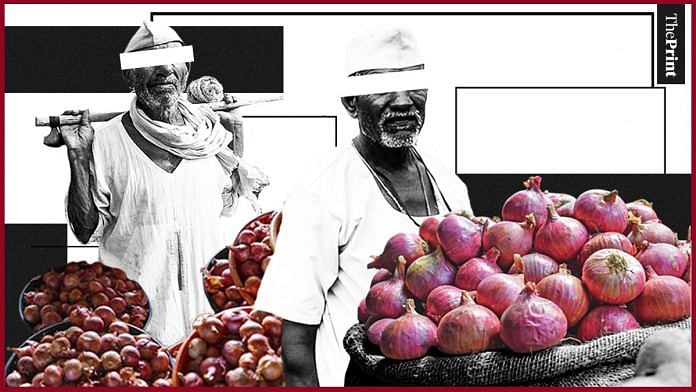The Narendra Modi government has banned the export of onions with immediate effect to lower rising prices and provide relief to consumers. The limit for stocking onions has been set at 100 quintals for retail traders, and 500 quintals for wholesale traders. Onion prices skyrocketed to Rs 80/kg in Delhi due to scarcity created by flash floods in some states.
ThePrint asks: Onion export ban: Is it smart to always protect interest of the consumer over the farmer?
Indian govts find it most convenient to use farmers as a tool to keep the urban class happy
 Ajay Vir Jakhar
Ajay Vir Jakhar
Chairman, Bharat Krishak Samaj
For many decades now, containing inflation has been a key government policy. Food constitutes a small portion of the total cost of living. If you keep the cost of food down, the rate of inflation is less and it hurts fewer people.
The Indian government finds it most convenient to use farmers as a tool to keep the urban class happy. This a trend that can be seen in other countries also. Urban classes unite on economic issues, which farmers are unable to do.
If the government has the political will, then onion prices can be stabilised and a consistent supply can be ensured throughout the year, within a price band of Rs 12-20/kg, depending on the season and the crop.
Regulation on exports is undesirable and counterproductive. What is required is an entity on the lines of Amul – an organisation that is owned by farmers and supported by the government. Acting as an aggregator, this organisation/authority would gain credibility as farmers would sell to it and the latter would then sell the produce to the people. There is a lack of understanding among policymakers that something like this can be done.
The government was completely silent when onions were being sold at Rs 2/kg. So, it has no moral authority to impose a ban on export of onions.
Hereafter, if farmers growing onion commit suicide, these can be attributed to the government. The government should invest some time in hiring experts and coming up up with a model similar to Amul’s.
Once the situation is back to normal, the onion export ban will be lifted. It happens across the world
 Narendra Taneja
Narendra Taneja
National Spokesperson, BJP
It’s not really right to look at the issue in terms of farmer versus consumer. It’s absurd because they both need each other. The government had to ban the export of onions because the prices were soaring. Once the situation is back to normal, the ban will be lifted. This happens across the world, it is part of economics.
The government is working for the farmers round the clock, but at the same time, let us not forget that 80 per cent of our farmers are also buyers of onions.
Onion is grown in only some parts of India. In economics, you have to sometimes regulate prices through policy intervention.
A ban for 5-10 days or a season lasts only until normalcy returns. In saying ‘farmer vs consumer’, you are assuming that farmers aren’t consumers. At the same time, since the prices have been going up, it is affecting everyone. It has been done in the interest of both the farmers and the consumers.
The Modi government is working on all possible ways. We are also importing from Afghanistan and other places so prices can come down. Market intervention is a temporary measure. It won’t have any adverse long-term impact. This is all economics, there is no politics to it. The Congress did the same when they were in power. It’s a well-practised and a well-known measure that any government resorts to.
When it comes to onions, ‘New India’ is just following the policies of ‘Old India’
 Siraj Hussain
Siraj Hussain
Visiting Senior Fellow, ICRIER
In 1849, Jean-Baptiste Alphonse Karr wrote: “The more things change, the more they stay the same”. So, it is no surprise that for onions, ‘New India’ is following the policies of ‘Old India’. Not satisfied with the minimum export price of $850 per tonne, the Modi government has announced stock limit of 100 quintals on retailers and 500 quintals on wholesale traders.
The government has a wrong impression that farmers sell their entire produce immediately after harvesting and it is only the traders who benefit from higher prices.
In Maharashtra alone, by 2016, farmers had created onion storage capacity of about 8 lakh tonne and there were plans to add another 4.3 lakh tonne by March 2019. Farmers, who had kept the stocks in the expectation of benefiting from higher prices, would have been devastated.
As in the past, TV channels seem to have defeated the farmers.
On 6 December 2018, the government announced Agriculture Export Policy. Arguing for a stable trade policy regime, the Modi government had cited examples of MEP and ad-hoc bans on onions that break export supply chains. But just within nine months, the policy has become a thing of the past.
Also read: Govt considers stock limit option to cut onion prices but Maharashtra polls an obstacle
Govt can protect the interests of the consumer as well as the farmer
 Pronab Sen
Pronab Sen
Former Chairman of National Statistical Commission
You can protect the interests of the consumer as well as the farmer. When there is a shortage, you have a situation where the farmer, in any case, is losing because he has less to sell. If the distressed farmer is not compensated with a higher price, it becomes a lose-lose situation. The sensible way to address this situation is not to choke the demands of the farmer but augment the supply in the market.
When we talk about any agricultural product, the difference between the price that a consumer pays and the rate at which the farmer sells his produce is the profit that a trader makes, and there is where the government needs to step in and trim this huge gap. It is not proper for the government to reduce the farmer’s earnings.
Traders have two ways of maximising profit. One way is to bring down the price that the farmer gets, and the other is to hold back supplies so that the consumer price goes up. The trader should be encouraged to buy from the farmer at the market price and government intervention should take place at the wholesale or retail level.
When you cut down on exports, you’re cutting off that part of the market, which the trader is looking at. But the trader will compensate for the loss by making an adjustment with the farmer and further burdening him or her. But if the government intervenes at the wholesale or the retail stage, then it can cut down on the traders’ margin without necessarily hurting the farmer.
Apart from battling pests and bad weather, a farmer now also needs to manage political risks
 Aruna Urs
Aruna Urs
Farmer
Onion is not a life-saving drug whose price regulation needs draconian government intervention. The urge to manage consumer perception seems irresistible to our political class and the onion farmer is not allowed to make an occasional profit. I wish there was an equal irresistible urge to protect farmers’ interest when onion prices languished at Rs 3/kg last year.
It is not as if whatever the consumer is paying is directly going into the farmers’ pockets. The farmer is lucky to realise a third of the retail price. As professor Ashok Gulati wrote in The Indian Express Monday, a majority of the profit is cornered at retail level. Unfortunately, farmers will bear the full impact of these ill-thought government interventions as these eat into their profit margins. No commission agent, stockist or retailer will cut his margins to lessen the impact on farmers. The cost of growing one kg of onions is close to Rs 9 and input costs have been increasing year-on-year. For a farmer, the dice is always loaded against him.
These knee jerk restrictions have serious implications on India being a credible and reliable exporter of agriculture commodities. Why should a foreign supermarket chain engage Indian exporters if he/she is unable to supply whenever there is a domestic price spike? Should exporters be only in business to clear domestic surplus?
Apart from battling pests and bad weather, a farmer now needs to manage political risks to seek his income. Farming is a game where the dice is loaded against the farmer while everyone chants Annadata Sukhibhava.
Also read: Modi govt to import more yellow peas, moong dal to check high inflation in pulses
By Taran Deol, journalist at ThePrint




The problem is more the govt intervenes in the market, the market will function even less. As a society we shall then have to bear the dead weight loss from intervention.
It is amazing that we are doing this for 70 yrs with the same results still the population does not learn at all.
There are rare occasions nowadays when farmers get a windfall benefit. Even in the present case, one does not know if smart traders have locked in the crop at a much lower price. As an urban consumer, one feels our interests should be subservient to those of farmers. Frequent bans can impede the development of stable, long term export markets. For commodities like onions that have a relatively longer shelf life, the interests of consumers could be protected by organisms like NAFED maintaining buffer stocks.
… organisations …Fortunately the iPad did not change the word into something else.